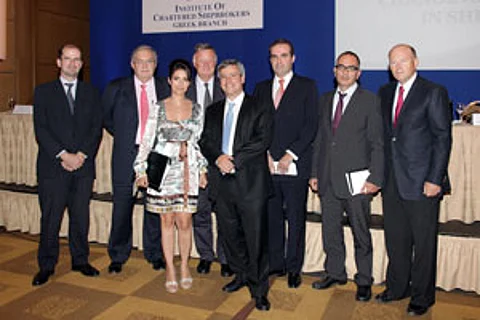

The Institute of Chartered Shipbrokers Greek branch hosted the Executive Council when it held its meeting in Athens on May 27 and 28.
ICS is an internationally recognised professional body representing shipbrokers, ship managers and agents throughout the world.
During the meeting, its members discussed ways of supporting the shipping industry worldwide and how shipping companies can become partners with ICS to enable the promotion of professionalism in the shipping industry worldwide.
It also discussed the increasing international reach of ICS into the major strategic shipping centres worldwide.
ICS Director, Alan Phillips, advised the council that many shipping companies with a global footprint were approaching ICS for tailored professional development packages for their junior executives.
The meeting also included a conference on the changing patterns in shipping. Nicolas Tsavliris, Chairman of the ICS Geek branch made reference to an address made by Dr Helmet Sohen over 20 years ago regarding the ever changing "landscape" in shipping.
Mr Tsavliris highlighted what he termed three fundamental changes: gigantism, burden sharing and ethos in shipping.
Professor John Tzoannos Secretary General of Ministry of Mercantile Marine, highlighted the many changing patterns with which shipping would need to cope in the coming years – including piracy, EU legislation and the environment.
Leonidas Dimitriadis Eugenides Chairman of Niver Lines Shipping made the point that if globalisation has taught us anything, it was that we are all linked, and that our actions impact on us all. Therefore, in order to support a safe and sustainable future we all have to work very hard with open minds and honesty.
Human factor considerations are as important as ever and we must focus on trying to secure strong fundamentals for the shipping industry itself. It is a must that the industry must win its constant struggle to attract and maintain qualified seafarers. Seafarers being the basis of ship management, the basis for shipping itself, the sole constant parameter in the ever changing shipping patterns.
Alan Marsh FICS Chairman of Braemar Seascope mentioned in his speech that the next six months would be critical in determining whether owners default or not on their new building commitments, but for this not to happen will require a much more positive approach for the shipyards to fully engage with owners to help- whether this is by giving additional credit or by working with Korean banks to advance finance to shipowners remains to be seen. But it is essential. Scrapping is still less than must happen to boost the bulk and tanker markets.
Richard Sayer, FICS Chairman of Galbraith's, mentioned that the dramatic fall in freight markets had triggered defaults by charters in the charter party market. The shipowner had a choice as to how to respond. He could rely on the remedies his charterparty provided- to lien cargo to withdraw his ship and to claim damages. Or he could proceed with legal action or with arbitration.
But for either of these approaches to succeed it is essential that the shipowner should obtain security: to do this he could arrest assets of the charter-ships or bunkers- injunct the charterer from removing those assets.
Dimitri G Vassilacos Manager of Shipping Finance division of National Bank of Greece focused on the health of the financial system as a precondition for the world economic recovery.
The world banking system, having avoided the systemic risk of collapsing, is currently facing an upward struggle dealing simultaneously with additional write-offs, a need for significant capital increase, a pressure to further slim down its balance sheet and on top of that the emerging problems from weak real economic activity. He warned that these issues would take time to be satisfactorily solved.
Being in a critically weak position, the banking system sought and received ample state support. However, strong state presence can lead to nationalism and hence protectionism, which could undermine the long journey to a globalised economy and all the benefits –economic or political- coming with it.
In any case, the post-crisis banking environment seems likely to be significantly different to the pre-crisis one with banks becoming again more conservative and more regulated entities and central banks re-examining their goals and tools used to achieve them.
Vasilis Mantzavinos Managing Director and Head of Piraeus Office of Global Shipping noticed that the shipping world had been facing over past couple of years an unprecedented erosion capital in the banking sector which has affected all the economy and inevitably also the shipping industry.
Professionalism will always be key to success and banks that avoided taking excessive risks during the earlier booming market and kept close to their clients will be the leaders in ship financing in future.
Piraeus-based maritime lawyer, Patrick Hawkins of Hill Dickinson, discussed how the challenging business environment in finance and shipping would impact on claims of all kinds including defaults in the charter and newbuild markets and in loan portfolios and the challenges faced by all professionals in the markets, whether lawyers, brokers or bankers to try to manage this difficult period with pragmatism and realism drawn from experience.
So far, he was optimistic that having rediscovered the true meaning of counterparty risk the market was coping well with these unprecedented conditions."
Closing the conference Natalia Magioli Komninou said that was the ICS' intention to continue with these conferences to help keep ICS members and fellow shipping professionals informed with developments in the shipping profession.
